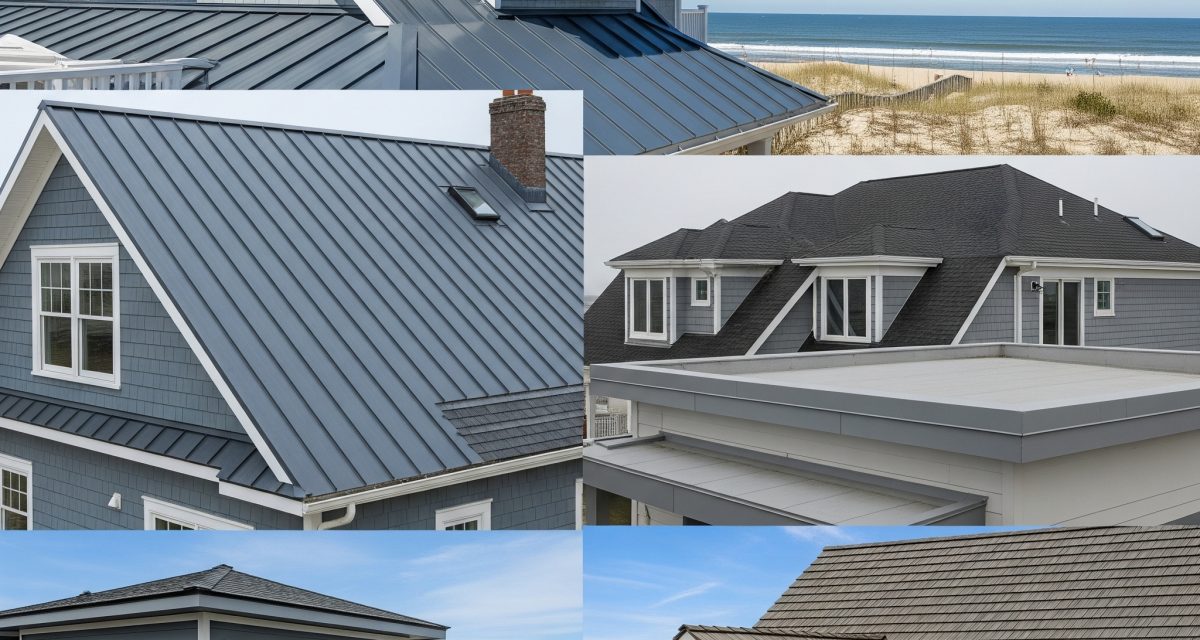Living near the New Jersey coastline offers stunning ocean views, fresh breezes, and a relaxed lifestyle—but it also comes with unique roofing challenges. Salt-laden air, strong winds, high humidity, and hurricane threats all contribute to faster roof wear if the wrong materials are used.
That’s why selecting the best roofing material for coastal homes in NJ is not just about curb appeal—it’s about long-term durability and storm protection.
At All State Roofing & Chimney, we specialize in roofing solutions built to withstand the harsh coastal environment. In this post, we’ll walk you through the best materials, compare their pros and cons, and help you make a smart, lasting investment.
Questions? Call us at (862) 295-7864
Or get a free quote here: https://allstateroofingandchimneynj.com/free-estimate/
What Makes Coastal Roofing Unique?
Coastal homes face intense conditions not typical inland, including:
-
Salt exposure – which corrodes metal and weakens fasteners
-
Strong wind and hurricanes – which can rip off poorly fastened shingles
-
Moisture and humidity – promoting rot, mold, and algae growth
-
UV exposure – which deteriorates some roofing materials faster
A good coastal roof must be:
Wind-resistant
Corrosion-resistant
Moisture-resistant
UV-resistant
Durable and low maintenance
Top Roofing Materials for Coastal Homes in New Jersey
Let’s break down the best roofing materials suited for New Jersey’s coastal environment:
1. Metal Roofing (Standing Seam or Aluminum)
Best for: Durability, wind resistance, salt spray protection
Why it works:
Metal roofing—especially aluminum or coated steel—is one of the most durable and corrosion-resistant materials for coastal homes. It handles high winds, rain, and sun exposure better than most materials and sheds water instantly.
Pros:
-
Lasts 40–70 years
-
Withstands wind gusts up to 140 mph
-
Reflects UV rays, improving energy efficiency
-
Lightweight and mold-resistant
-
Aluminum resists rust from salt air
Cons:
-
Higher initial cost
-
May require soundproofing underlayment
-
Aesthetic may not fit traditional styles
Cost in NJ: $8–$15 per square foot installed
2. Architectural Asphalt Shingles
Best for: Budget-conscious homeowners seeking enhanced performance
Why it works:
Unlike basic 3-tab shingles, architectural shingles are thicker and more wind-resistant—an essential factor for homes near the shore. Some shingles are even rated for 130 mph winds and offer algae-resistant granules for humid climates.
Pros:
-
Affordable with strong warranties
-
Available in wind- and algae-resistant versions
-
Mimics the look of more expensive materials
-
Easier to install and repair
Cons:
-
Shorter lifespan than metal or tile (20–30 years)
-
Can deteriorate faster under harsh sun or moisture
-
Not naturally resistant to salt damage
Cost in NJ: $4–$7.50 per square foot installed
3. Synthetic Slate or Shake Roofing
Best for: Homeowners seeking beauty + coastal durability
Why it works:
Synthetic roofing materials (like polymer-based slate or shake) offer the rich, classic look of wood or stone but with added benefits like UV protection, mold resistance, and minimal maintenance.
Pros:
-
Highly impact- and wind-resistant
-
Lightweight—won’t strain roof structure
-
Does not absorb water or rot
-
Many products are Class A fire-rated and hurricane-rated
Cons:
-
Higher upfront cost
-
Less traditional than real slate or cedar
Cost in NJ: $8–$12 per square foot installed
4. Clay or Concrete Tile Roofing
Best for: Mediterranean-style homes or historic properties
Why it works:
Tile roofing can last over 50 years and performs well in heat and moisture. While more common in southern climates, some coastal NJ homeowners use them for upscale aesthetics and performance.
Pros:
-
Extremely durable and long-lasting
-
Resistant to mold, salt air, and UV rays
-
Available in many colors and textures
-
Excellent insulation properties
Cons:
-
Heavy—requires reinforced framing
-
Expensive to install
-
Can crack under impact or freeze-thaw cycles
Cost in NJ: $12–$20 per square foot installed
5. Cedar Shake Roofing (Treated)
Best for: Traditional and rustic-style homes
Why it works:
Cedar shake is a natural insulator and offers beautiful texture and style. With modern pressure treatments and sealants, it can resist rot and insects better—but coastal climates still require extra care.
Pros:
-
Classic, upscale appearance
-
Good wind and thermal resistance
-
Eco-friendly and biodegradable
Cons:
-
High maintenance (must be treated and cleaned)
-
Prone to mold, rot, and warping without proper care
-
Not ideal for highly humid zones
Cost in NJ: $10–$15 per square foot installed
Roofing Features You Should Prioritize Near the Coast
Regardless of the material you choose, make sure your roof has:
Corrosion-resistant fasteners and flashing (aluminum, stainless steel)
High wind rating (minimum 110–130 mph)
Proper underlayment and moisture barrier
Algae- and UV-resistant materials
Professional installation with hurricane compliance
Why Choose All State Roofing & Chimney?
With over 10 years of experience in New Jersey’s diverse roofing needs, we provide:
-
Certified installation of wind- and moisture-resistant roofs
-
Coastal code-compliant roofing systems
-
Fast emergency repairs after storm damage
-
Expert help with insurance claims and inspections
-
Transparent estimates and long-term warranties
Call (862) 295-7864 today
Or get a free estimate here: https://allstateroofingandchimneynj.com/free-estimate/
Final Thoughts
Your coastal home deserves a roof that’s as tough as it is attractive. By choosing the right material for NJ’s coastal environment, you’ll reduce long-term maintenance costs, protect against storm damage, and ensure peace of mind.
Whether you’re building a beach house, renovating your shore property, or replacing an aging roof, All State Roofing & Chimney is here to help with expert advice and premium installation.
